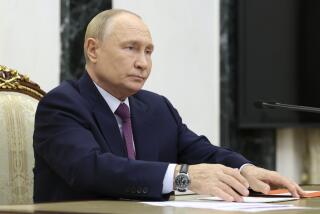Yeltsin Calls for End to Nuclear Arms in Russia : Weapons: He also says the republic will demand ‘a finger on the button’ controlling the Soviet arsenal.
WASHINGTON — Russian Federation President Boris N. Yeltsin, whose republic contains most of the Soviet nuclear arsenal, called Tuesday for an international moratorium on underground weapons tests and pledged to pursue the “total elimination of nuclear weapons in Russia.”
Yeltsin, in his first detailed remarks on arms control since the collapse of the August coup, made clear that he intends to assume a key role in strategic decisions. He confirmed that nuclear weapons are now being moved to Russia from two other republics and said that Russia will demand “a finger on the button” now controlled by the Soviet central government.
The Russian leader’s comments in an interview Tuesday with Cable News Network intrigued U.S. officials, who said that it is impossible to tell whether his remarks represent the germ of a specific arms control proposal or just goodwill rhetoric.
“We’re still trying to figure out where he’s headed,” said one Bush Administration official who spoke on condition of anonymity.
At the same time that he was calling for eventual elimination of the nuclear weapons, Yeltsin also was sounding familiar cautionary points, suggesting that arms reductions must be made in concert with other nations that possess nuclear arms.
“We are in favor of total elimination of nuclear weapons in Russia. . . ,” Yeltsin said. “But then there are certain factors involved, i.e., reasonable security. We need to maintain parity with other nations, and we need to promote the idea of non-proliferation and extend it to other countries.”
Yeltsin indirectly criticized the pending Strategic Arms Reduction Treaty negotiated by President Bush and Soviet President Mikhail S. Gorbachev. The pact, which has been signed by both sides but awaits ratification, calls for significant cuts in the superpower nuclear arsenals.
“I think personally that it is not a major victory when 50% of nuclear weapons are earmarked for elimination in a situation when 5% is enough to destroy the whole world,” he said. “We need to continue our work to eliminate all nuclear weapons, and Russia will work to bring that about.”
Yeltsin’s comments demonstrated that the Russian leader, whose influence has rocketed since the aborted coup against Gorbachev by Soviet hard-liners, is eager to establish himself as a major figure in Soviet defense and arms control issues.
“What Yeltsin’s carving out for himself is a substantial role in Soviet defense policy, in nuclear planning and in nuclear use,” said Edward L. Warner, an expert on Soviet strategic policy for the RAND Corp., a Santa Monica-based think tank. “A lot of his positions may be old wine, but this is a very important new bottle.”
American officials noted that Yeltsin’s positions on arms control--indeed, his foreign policy views in general--remain largely unknown. His comments in the CNN interview contained points of both conflict and continuity with established Soviet positions.
“There are a lot of things we don’t know,” said a senior Pentagon expert on arms control. “It’s just too early to know what (Yeltsin) represents or where the Soviet military is going, so we always lean upon the plans we have in the files, which have a certain momentum.”
Yeltsin, confirming earlier reports, said that long-range nuclear weapons are being withdrawn from the Ukraine and that such weapons will also be moved out of Kazakhstan. Both have declared themselves non-nuclear republics, as has Byelorussia.
Neither Yeltsin nor Bush Administration officials, however, reported any withdrawals of nuclear weapons so far from Byelorussia, although such a move is considered likely.
Yeltsin also raised the nuclear security issue Tuesday at the Congress of People’s Deputies, where he said that, as the Soviet Union disintegrates, Russia will guarantee “the preservation of the integrity of the nuclear potential, the army.” He specifically assured his country and the world that his nation’s nuclear weapons would not fall into the hands of “hawks or extremists.”
Under a proposed resolution to be voted on by the Soviet lawmakers, a revamped union would be obliged to take measures to guard against “unsanctioned” use of nuclear weapons and to guarantee that Byelorussia, Azerbaijan or the other republics do not become independent nuclear powers.
About 80% of the Soviet Union’s roughly 30,000 nuclear warheads are believed to be deployed within the Russian Federation. The Ukraine has an estimated 10% of the total, while Kazakhstan and Byelorussia each have 5% or less. Other Soviet republics have much smaller nuclear arsenals.
A Pentagon official said that SS-18 ballistic missiles in Kazakhstan and SS-19 and SS-24 missiles in the Ukraine are expected to be the first nuclear arms to be withdrawn into Russian territory.
“They sense that those weapons most trouble the international state of mind, so maybe they should reassure people they’re dealing with weapons that can reach other countries,” said a knowledgeable defense official. “The shorter-range weapons they’ll deal with later if they have to.”
Yeltsin also confirmed earlier reports that the Russian Federation has demanded a new role in the process under which the Soviet central government could order an actual firing of nuclear weapons.
“We have set up a committee to control nuclear weapons so that (they are) not used either by hawks or ultra-left- or ultra-right-wing forces or terrorists,” Yeltsin said.
Staff writer John-Thor Dahlburg in Moscow contributed to this story.
More to Read
Sign up for Essential California
The most important California stories and recommendations in your inbox every morning.
You may occasionally receive promotional content from the Los Angeles Times.











